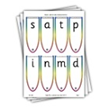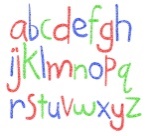English
English, including spellings, punctuation and grammar as well as composition, is taught through units which are based on quality texts. These texts are listed in our English Curriculum Map*, but include works by Carol Ann Duffy, Julia Donaldson, Roald Dahl and Michael Morpurgo. Children study a wide range of genre including narrative, non-fiction and poetry.
There is a big emphasis on transferable skills with the expectation that the standard of reading and writing in other lessons is as good as it is in discrete English lessons.
Phonics & Spellings
 Phonics and Spellings are taught daily in discrete sessions or as part of an English lesson. We follow a government approved scheme which leads the children through each phase (1-6) to become confident readers, writers and spellers. The ability to understand and use phonics is vital to a child’s development in these 3 areas and our Foundation Stage team put in a lot of work to give children the best start. (Phases 1-4). This is followed up in year 1 (phase 5) and year 2 (phase 6) and into years 3 and 4. The expectation is that children will have completed phase 6 by the end of KS1 but for many children it takes a bit longer. We use a wide range of online resources to support the teaching of phonics along with spelling games and activities.
Phonics and Spellings are taught daily in discrete sessions or as part of an English lesson. We follow a government approved scheme which leads the children through each phase (1-6) to become confident readers, writers and spellers. The ability to understand and use phonics is vital to a child’s development in these 3 areas and our Foundation Stage team put in a lot of work to give children the best start. (Phases 1-4). This is followed up in year 1 (phase 5) and year 2 (phase 6) and into years 3 and 4. The expectation is that children will have completed phase 6 by the end of KS1 but for many children it takes a bit longer. We use a wide range of online resources to support the teaching of phonics along with spelling games and activities.
Children learn spellings weekly through ‘Write Words’. They bring home ten spellings appropriate to their phonic level and only change words when they can spell them. This ensures children are building up their spelling vocabulary at a level appropriate to them.
Reading
 We are currently promoting the development of reading through the teaching of inference skills. In Foundation stage the children learn to read as they use their phonic knowledge to segment and blend sounds in words. Daily reading at home and school builds up this skill for them to become fluent and confident readers. This ability will continue to develop throughout years one and two. At all stages of the reading process children discuss the books with the adult to develop their understanding of the text, building up to making reasoned inferences about the meaning of what they read. Children are encouraged to read ‘in phrases’ so that they understand the sense of the text rather than just ‘decoding’ single words. Fluency and understanding are developed ‘hand in hand’ as the child makes progress at their own pace.
We are currently promoting the development of reading through the teaching of inference skills. In Foundation stage the children learn to read as they use their phonic knowledge to segment and blend sounds in words. Daily reading at home and school builds up this skill for them to become fluent and confident readers. This ability will continue to develop throughout years one and two. At all stages of the reading process children discuss the books with the adult to develop their understanding of the text, building up to making reasoned inferences about the meaning of what they read. Children are encouraged to read ‘in phrases’ so that they understand the sense of the text rather than just ‘decoding’ single words. Fluency and understanding are developed ‘hand in hand’ as the child makes progress at their own pace.
Children bring home a ‘reading scheme’ book appropriate to the phonic phase they are working at. They also choose books to read/enjoy from our extensive school library and individual class libraries. We are currently trying to promote ‘reading miles’ with our children. This means we provide as many opportunities as possible for children to listen to, read and enjoy a wide range of texts.
Writing
 In all stages of the writing process children are encouraged to ‘speak a sentence’ before committing it to paper. In the Foundation Stage this begins with speaking sentences which are then scribed by the teacher, mark making and making phonically plausible attempts at writing sentences (emergent writing). As the child grows in confidence they will become more independent in their writing and begin to apply grammar to improve their sentence structure. The National Curriculum places a large emphasis on grammar and spelling and these are taught as part of the English Unit lessons outlined above. Some aspects of grammar are taught discretely but mostly they are taught in conjunction with the writing aspect of the English lesson.
In all stages of the writing process children are encouraged to ‘speak a sentence’ before committing it to paper. In the Foundation Stage this begins with speaking sentences which are then scribed by the teacher, mark making and making phonically plausible attempts at writing sentences (emergent writing). As the child grows in confidence they will become more independent in their writing and begin to apply grammar to improve their sentence structure. The National Curriculum places a large emphasis on grammar and spelling and these are taught as part of the English Unit lessons outlined above. Some aspects of grammar are taught discretely but mostly they are taught in conjunction with the writing aspect of the English lesson.
Handwriting
 Our Foundation Stage children learn to form letters using a pre-cursive style. When they enter Key Stage 1 they learn to join letters using the school’s cursive style. Discrete handwriting sessions form part of the children’s phonics and spellings sessions but are also addressed in every lesson.
Our Foundation Stage children learn to form letters using a pre-cursive style. When they enter Key Stage 1 they learn to join letters using the school’s cursive style. Discrete handwriting sessions form part of the children’s phonics and spellings sessions but are also addressed in every lesson.
*The English Curriculum Map can be found in the Policies and Documents section of the website.
